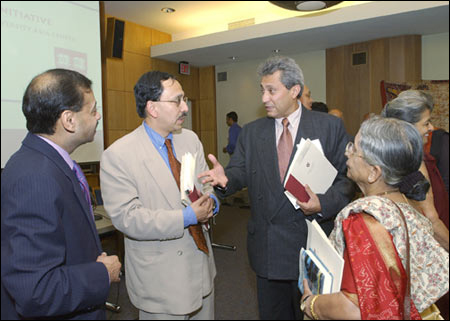Conference marks expansion of South Asian Studies
Global studies enhance undergraduate curriculum

A high-level group of academic leaders and policy-makers from India, Pakistan, and Bangladesh met with U.S. academics at Harvard recently for a conference delving into South Asia’s most intractable problems. The conference kicked off a new initiative to expand South Asian studies, as Faculty of Arts and Sciences Dean William C. Kirby re-evaluates the undergraduate curriculum and works in concert with President Lawrence H. Summers to enhance global studies.
The event, titled “South Asia: Bridging the Great Divides,” marked a rare convergence of individuals who are capable of shaping public policy in the region during a time of heightened volatility. The conference brought together South Asian luminaries such as Krishna Bose, M.P., chair of the Parliamentary Committee on Foreign Affairs in India; Saleem Sherwani, M.P., former minister of state of foreign affairs in India; Syeda Abida Hussain, former member of Parliament, cabinet minister, and ambassador to the United States from Pakistan; and Amitav Ghosh, Distinguished Professor of Comparative Literature at the City University of New York. Along with remarks by President Summers and Nobel laureate Amartya Sen, master at Trinity College, Cambridge University, panelists addressed the thorny problems of partition, migration, and borders; sovereignty; religion and human rights; and the impact of business and economic development on international relations.
The South Asia Initiative is a step toward fulfilling President Summers’ vision of Harvard as a truly international university – one in which students gain a thorough and firsthand understanding of world affairs. “South Asia is, on the one hand, enormously important to the future of the world and of the United States, and yet, the attention that is paid in American media and academic life is substantially smaller than is paid to East Asia,” said President Summers. “There is an enormous need for us to enhance our understanding of contemporary South Asia, and the development of our study of the region will be a major priority in the years ahead.
“When we examine why economic growth has picked up so suddenly in parts of that region; or how concepts of federalism may need to be revised; or the profound questions of the role of ethnicity and identity raised by the situation in Kashmir; or when we recognize that in the realm of public health, the region has the highest leverage possibility with respect to the fight against AIDS – all of these are things that command the attention of a university such as Harvard.
“The fact that Harvard’s tradition of international connections and public service can convene such a remarkable group of government officials and scholars speaks to the enormous influence that our ideas and our research can have.”
Under the direction of Sugata Bose, Gardiner Professor of Oceanic History and Affairs, the Asia Center has embarked on a new set of research projects designed to comprehensively examine South Asia’s economy, politics, and culture. The initiative will include a set of research modules that aim to identify South Asia’s most pressing problems, offer innovative approaches for solving them, and set an agenda for future study and public action. “We at Harvard want the best scholarly research on South Asia to inform new directions in policy,” said Professor Bose.
The research modules will address the topics of sovereignty and citizenship; partition and its economic consequences; the historical demography of partition; border culture; history and education in the age of the World Wide Web; literature and culture in the South Asian diaspora; human development, equity, and human rights; and regional cooperation.




